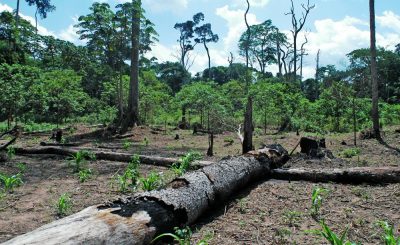World Wildlife Fund Calls Out British Banks, Funding Deforestation
The UK Government should stop British banks funding deforestation.

All Global Research articles can be read in 51 languages by activating the “Translate Website” drop down menu on the top banner of our home page (Desktop version).
Visit and follow us on Instagram at @crg_globalresearch.
***
Nature charity WWF has called on the UK Government to ensure that UK banks and other financiers are not funding deforestation in Brazil, Indonesia and elsewhere around the world.
The charity said that 300 UK-based financiers are directly providing £40 billion in funding to companies that threaten Brazilian and Indonesian rainforests. The funding is provided through both investments and loans, WWF said.
Many of the companies are involved in the production of beef, palm oil, soy and cocoa, agricultural commodities whose farming threaten rainforests.
Threats
Other common crops include timber, paper and rubber, all of which are helping to drive the destruction of nature in some of the world’s most diverse habitats.
“Deforestation is one of the biggest threats to our climate, to wildlife and to the local people who rely on forests for their livelihoods,” said Karen Ellis, director of sustainable economy at WWF-UK.
“Every hectare of rainforest that is destroyed makes it harder to limit global warming to below the 1.5C target set out in the 2015 Paris Climate Agreement. Alarmingly, UK investments in forest-risk commodities have not significantly reduced since then.”
The UK currently has no laws that require products to come from sustainable sources. Any such efforts are made voluntarily, which WWF says leaves the UK’s supply chains exposed to deforestation.
It called on the government to develop a system for ensuring that UK financiers check they are not causing deforestation elsewhere as the country tries to reach net zero by 2050. Voluntary commitments are not enough, the charity said.
Committed
“The UK Government committed to protect forests and address nature loss impacts from financial decision-making – we won’t forget if they fail us on this promise,” Ms Ellis said.
“The Environment Bill will require companies trading in palm oil, soy, and other forest-risk commodities to undertake due diligence checks.
“This must equally apply to firms that finance forest-risk commodities, as voluntary measures clearly aren’t giving forests the protection they urgently need.”
The Treasury said:
“We are committed to the UK being the best place in the world for green and sustainable investment and were the first country in the world to commit to fully mandatory reporting by businesses across the economy on the financial risks posed by climate change.
“Our new integrated sustainability disclosure requirements go further by requiring companies, pension schemes, financial services firms and their investment products to report on the impact they are having on the climate and environment, helping to ensure investors have the information they need to drive positive environmental impact.”
*
Note to readers: Please click the share buttons above or below. Follow us on Instagram, @crg_globalresearch. Forward this article to your email lists. Crosspost on your blog site, internet forums. etc.
August Graham is the City reporter for PA.
Featured image is from Flickr, Peter Prokosch

